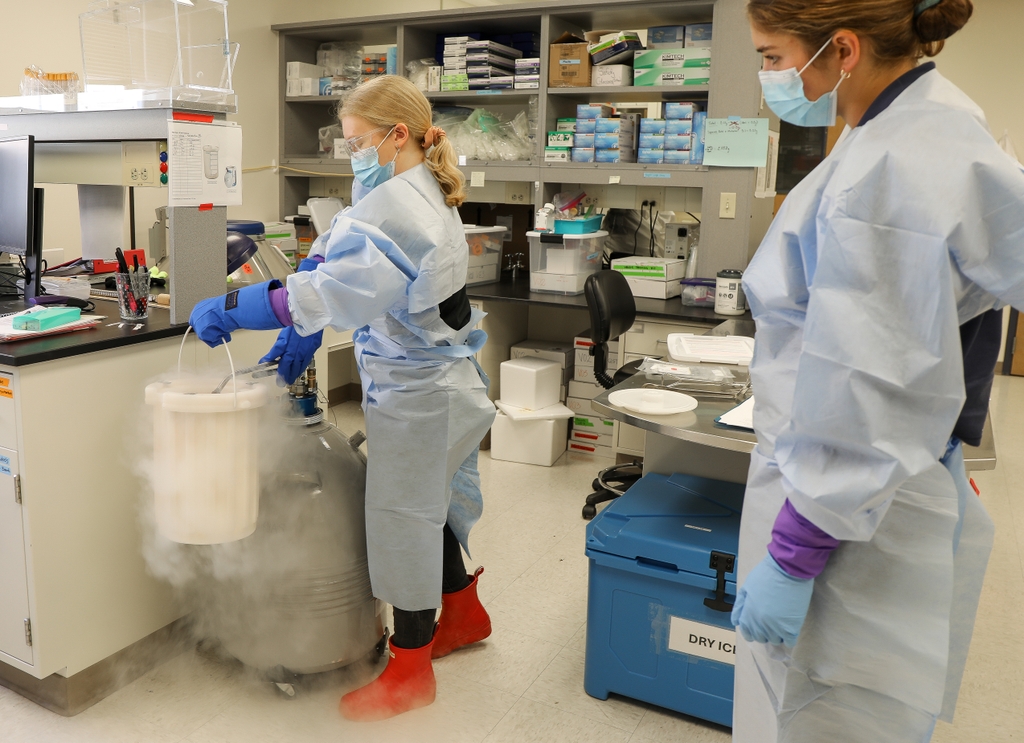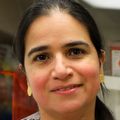
At Oregon Health & Science University, a dedicated team is working across the organization to ensure the health and well-being of pregnant individuals are protected, while advancing scientific knowledge.
Since its 2009 inception, the Maternal Fetal Medicine Research Unit, known as the Pregnancy Research Group, has coordinated a vast array of research involving pregnant patients.

Mónica Rincón, M.D., M.C.R., who leads the group, ensures scientific studies are conducted in a way that is both ethical and patient-centered.
"We're involved in almost all research related to pregnancy," Rincón said. "It's not just limited to the OB/GYN department; it involves departments across the organization. If someone from psychiatry, pulmonology or another department wants to study pregnant patients, we try to connect them with the appropriate resources.
"Our goal is to ensure patients are protected and not overwhelmed with study requests, especially when they're already dealing with the complexities of pregnancy and childbirth."
The group's efforts are wide-ranging, supporting research on topics as varied as diabetes during pregnancy to iron infusion therapies.
"Right now, we're involved in a study looking at the best ways to administer iron supplementation to pregnant individuals," Rincón said. "We're testing whether oral iron is sufficient for some patients, or whether intravenous iron is needed."
Additionally, the group plays a pivotal role in managing studies related to rare and serious pregnancy complications, such as Twin-to-Twin Transfusion Syndrome. The group collects critical data that can improve outcomes for these high-risk pregnancies. Rincón is particularly focused on ensuring these studies adhere to the highest standards of patient care.
Enabling vital research
The unit collaborates closely with researchers like Amy Valent, D.O., an obstetrician-gynecologist with a subspeciality in maternal-fetal medicine. Valent's research centers on understanding the complex biology of pregnancy, including the role of lipids, or fats, in fetal development.
"When I came to OHSU, I was drawn to the opportunity to study the placenta and how it functions in pregnancy," Valent said. "Lipids are crucial for fetal brain development, but we still don't fully understand how they cross the placenta. Research like mine wouldn't be possible without the support of the Pregnancy Research Group."
Valent credits the group's involvement in everything from helping secure Institutional Review Board approvals to patient recruitment and regulatory compliance.
"They make sure we meet all the necessary regulations and help with all the logistical aspects of running trials," she said. "Without them, I wouldn't be able to conduct these studies. They're integral to the success of our research."
Nicole Marshall, M.D., M.C.R., IBCLC, FACOG, is head of the Maternal-Fetal Medicine division and works closely with the Pregnancy Research Group to conduct her research. Her research often involves enrolling pregnant people throughout gestation, collecting essential samples at the time of delivery and then following patients and their infants for the first year after birth.
"During my initial Oregon Clinical and Translational Research Institute KL2 award, I attempted, by myself, to collect placental samples for all 40 of my enrolled participants, which involved coming in at all hours of the night, on weekends and on holidays," she said.
"Later, when I was awarded an NIH award, we enrolled nearly 200 pregnant people. I relied on the essential services of the MFM Research Unit team to recruit patients and collect delivery samples; there is no way I could have completed this project on my own as a busy clinician-scientist. We are now able to participate in multi-site studies across the U.S. because our MFM Research Unit team serves as the bridge between our clinicians and participants."
Marshall said she cannot emphasize enough the importance of researchers who work with pregnant people using the services of the pregnancy research group.
"In obstetrics, there is only one chance to enroll patients by a specific gestational age and collect delivery samples," she said. "It requires a highly trained and coordinated team to follow and track patients who could deliver at any time, which is why the MFM Research Unit is such a critical part of our department research success."
Another aspect that distinguishes OHSU's Pregnancy Research Group is their commitment to patient-centered research. Rincón underscores that the group works diligently to ensure that pregnant individuals aren't bombarded with multiple study requests during an already stressful time.
"We want to avoid overwhelming the patients, especially in high-risk cases. We aim to ensure that our patients feel supported and well-informed," she said.
Global reach
This thoughtful approach to patient care extends beyond U.S. patients. Rincón also has developed international research collaborations. Rincón works closely with doctors in her birth country, Colombia, to improve contraception counseling, addressing a significant gap in family planning services for new mothers, mostly in rural areas.
"The issue is that many women wouldn't have access to family planning counseling until their postpartum visit, if this occurs, often resulting in very short inter-pregnancy intervals," she explained. "We worked to provide family planning services before they left the hospital, immediately after delivery."
In addition to their work in Colombia, the group also is involved in global research initiatives in Africa and Helsinki, expanding their reach and impact. Valent pointed to these international collaborations as a testament to the group's broad scope and commitment to improving maternal health globally.

Christian Huertas Pagan, M.D., a clinician in Puerto Rico, before coming to OHSU, who has worked on the Pregnancy Research Group for more than four years, says:
"In research, people are often worried about experimentation; there are trust issues, especially with vulnerable populations," he said. "Monica has made sure to recruit team members with diverse backgrounds, who can speak the patient's language, so we can explain the research and people feel cared for."
Valent said diversity is critical for improving the accuracy and applicability of research outcomes.
"The more diverse the population in our studies, the better the research will reflect real-world outcomes," she said. "Monica and her team have made a concerted effort to improve diversity in research by building relationships with communities and ensuring that traditionally underrepresented populations are included."
The Pregnancy Research Group is committed to improving equity in research. The team also is investigating why some patients choose not to participate in studies, with the goal of addressing any barriers to participation.
"We want to understand what's preventing people from participating, so we can make our research more inclusive and equitable," Rincón said.
For the multidisciplinary team, the ultimate goal is to improve the long-term health of mothers and their children.
"The effects of pregnancy, including exposure to certain conditions or treatments, can have lasting effects on both the mother and child," she said. "By studying pregnancy more deeply, we can understand these long-term impacts and help improve outcomes for future generations."






